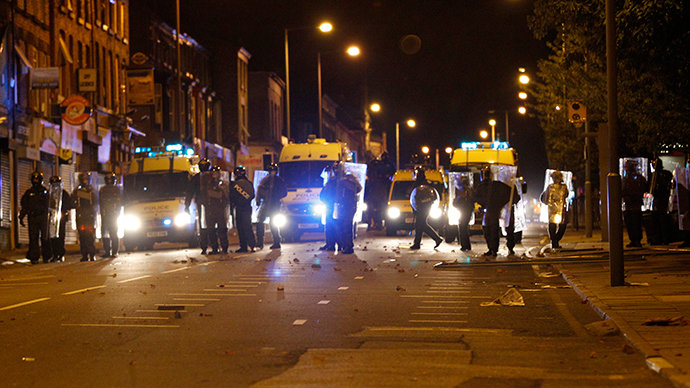‘100 riot police’ clash with housing justice activists in South London, 6 arrested

Six people were arrested on Tuesday night in a London council estate, following a standoff between riot police and activists protesting against the ‘social cleansing’ of London's poor.
Southwark's Aylesbury Estate has become a focal point for campaigners who strongly oppose controversial regeneration schemes in the capital. It has been earmarked for demolition as part of a £1.5 billion regeneration scheme spearheaded by Southwark Council.
Activists occupied flats in the estate on February 1 in protest against the development project. But Southwark council sought to evict the campaigners on Tuesday evening, following an official court order. Met officers arrived on the scene to assist the local authority.
Among the activists present when police arrived were members of housing campaign group Aylesbury Occupation. Following a tense standoff with police, the campaigners eventually dispersed.
Police grinding down the metal sheets. This is the response to housing protest pic.twitter.com/RDNPJUydCS
— Aylesbury Occupation (@Fight4Aylesbury) February 17, 2015
Activist Charlie Ebert, who was present during the eviction, said police approached campaigners in a heavy handed fashion. He stressed the Aylesbury Estate was symbolic of a housing shortage that is severely impacting on London’s poorest.
“What’s going on here is effectively social cleansing to make London a nice ‘clean’ place for the rich,” he told the Guardian.
“A group of us wanted to stand in the way of that so we took over some of the flats as an act of solidarity.”
In a statement, Aylesbury Occupation said activists were confronted by roughly 100 riot police who used “angle grinders to cut through metal barriers” blockading the occupied flats.
The protest group stressed it had cleaned, decorated and revitalized the apartments campaigners had been occupying.
“As police stormed in, a few people stayed to symbolically hold the barricade, while most of the occupiers just climbed into the building next door,” a spokesperson for the campaign said.
Southwark Council says the activists who occupied flats on the estate are squatters who do not represent the views of local residents. The local authority told the Guardian it has built more affordable houses than any other London borough in recent years.
Scotland Yard said police were present at the Aylesbury Estate last night to support Southwark Council staff in ensuring an eviction order was complied with.
Pictures (2 of 2): #TSG evict @Fight4Aylesbury occupation tonight. New block squatted. #Housing#aylesburyestatepic.twitter.com/P8ETbwDSYq
— Guy Smallman (@GuySmallman) February 18, 2015
A Met Police spokesman told RT that many people voluntarily departed from scene, while others refused to move.
He said six people were arrested for offences of “criminal damage and assault,” and each of these individuals remains in custody.
But the Met's allegations have been countered by Ayesbury Occupation. The group insists activists who occupied the council estate are not guilty of criminal damage.
Following Tuesday night's eviction, it said activists occupied a new block on the Aylesbury Estate on Wednesday morning.
The campaign said its latest occupation on the Southwark council estate “is going strong.”
“As in the old building, our aim is to repair the damage done to these flats by the council, and bring them back to life as a hub of resistance for the estate,” it added.
Scotland Yard says officers remain on the scene and will continue to work with Southwark Council and “other relevant parties.”
‘Social cleansing’ in London
In collaboration with Notting Hill Housing, Southwark Council plans to build 4,000 new homes on the site of the Aylesbury Estate over a 20-year period.
Tony Blair made his first public address there as prime minister in 1997.
Speaking to residents from one of the estate’s concrete walkways, he vowed to rescue those who had been “forgotten by government” from a harsh inner-city existence.
However, residents voted by a considerable majority four years later against a redevelopment project planned for the estate. The scheme reportedly sought to yield greater economic diversity in the community.
Occupation still going strong at the Aylesbury estate. New day, new building. #HomesForAllpic.twitter.com/dAkJJPZ53m
— Anarcha Penguin (@WolvoPingu) February 18, 2015
Critics argue Britain’s housing crisis has been exacerbated by stagnating wages and the proliferation of insecure jobs and zero-hour contracts.
Last month, thousands of demonstrators took to the streets of London to demand Mayor Boris Johnson address the deepening crisis.
The demonstration was backed by Labour MPs, campaign groups and trade unions opposed to government policies they warn are contributing to increased homelessness.
Campaigners gathered at the protest were particularly concerned about social cleansing. They called for reduced rents, an end to the coalition’s benefit cuts, and secure tenancies for all renters. They also demanded a halt to the demolition of good-quality council homes in London.











